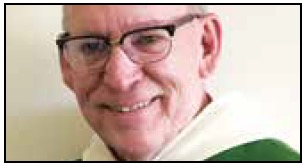Easter Memories That Feed Us
In tough times, memories of the Eucharist bring healing
Father Ronald Patrick Raab Comments Off on Easter Memories That Feed Us
 Priesthood has offered me opportunities to walk with people to Easter sacraments within varied communities. I recall families renting limousines for their children after receiving first Communion in a wealthy parish. In another community, adults walked from tents on the streets to be received in the Church during the Easter Vigil. Some people were veterans of wars that were still raging. Others were preparing for marriages and solid careers.
Priesthood has offered me opportunities to walk with people to Easter sacraments within varied communities. I recall families renting limousines for their children after receiving first Communion in a wealthy parish. In another community, adults walked from tents on the streets to be received in the Church during the Easter Vigil. Some people were veterans of wars that were still raging. Others were preparing for marriages and solid careers.
I remember a heroin addict who relapsed in Lent but received first Eucharist and confirmation at the Easter Vigil. I will never forget a young man who stood in the center aisle of the community, his clothing soaking wet from living in a tent, declaring his desire to receive the body and blood of Christ during one rainy Easter Vigil. These memories have formed my life, my prayer and my priesthood.
I recall a young college graduate who was received into the Church and was married a month later. I remember the man suffering mental anguish who came back a few days after Easter and held several staff members at knifepoint because he thought his first Communion would make him pastor.
I remember engineers, teachers, factory workers and immigrants, all desiring to be within a community of faith. I remember parents arguing about photographs and making sure their seats were close to the altar on first Communion day. I remember children’s eyes lighting up when receiving the body of Christ. These memories feed me as they, too, are bread from heaven.
These Easter memories reveal the meaning of the Eucharist. What happens on the altar does not stay on the altar. The Eucharist is lived out in people’s hearts, lives and relationships. Eucharist overflows the human heart, and it is not only a moment of experience. The Eucharist is visceral and alive. The body and blood of Christ is consumed to make us what we eat. The crumbs of the body of Christ live in tents under bridges and beg on our streets. For years, we feed on our sense of belonging and our memories become food for the rest of our lives.
I recall my first Communion 60 years ago. I received the Eucharist for the first time on May 3, 1964. I knelt at the high altar in St. Joseph’s Church, Mishawaka, Indiana, to receive the body of Christ. I knew something very important was happening. I knew somehow that the adults around me were very proud of this moment, and that they understood it would lead me into adulthood. I am still being sent into the world from that altar from all those years ago.
I look back during the Easter season and realize my experiences in the sacramental life still flow within me. When I served as pastor, I wanted families to realize that the reason we educate our children in faith is so they will have something to fall back on when life gets tough. I wanted children to understand their second Communion was more important than the first. The pattern of living in Christ takes a lifetime.
When people face tough times, even the memories of the Eucharist still become food for healing. I want the adults to remain hungry for God so as to reveal to their children the need for God’s beloved food for us. I want the Church to remain hungry for justice so as to implement the Gospel call to serve, unite and inspire. God’s mercy and forgiveness always remain.
In May, we conclude another Easter season. I now minister among priests whose arms are too weak to lift the prayers of people seeking sacraments. Their memories are weak about ministries of the past. Their vision of sacraments remains strong, and their prayer is coming to fruition at the very mercy of God. I am grateful to be among them.
I now entrust the Easter sacraments to our young priests. They will step into a position of welcoming the lost and educating the searching. They will assume the position at the altar and raise their hearts, lives and hands in prayer for those seeking to belong to God. They will sing of God’s victory among the poor and help the Church unite in mission, living the Paschal Mystery among God’s abandoned and those longing to find a new life from our baptismal fonts. They will remember with great fondness their initiation into the mystery of the Eucharist and will recall one day their own first Communion.
FATHER RONALD PATRICK RAAB, CSC, serves as religious superior at Holy Cross House, a medical facility and retirement home for the Congregation of Holy Cross, Notre Dame, Indiana. Learn more at www.ronaldraab.com.





